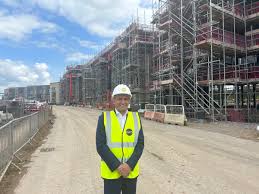Measures included in the King’s Speech aimed at boosting housebuilding and devolving more powers from Whitehall to the regions have been widely welcomed by key business figures in the West of England.
The Planning and Infrastructure Bill – one of the 40 included in the speech that will shape the first year of the new Labour government – was trailed strongly ahead of the election.

With the West of England critically short of new homes for its expanding population, the bill – with its aim of unblocking the planning system and allowing some building on parts of the green belt – is viewed as essential for the future growth of the region.
Victor da Cunha, chief executive of Bath-based housing association and housebuilder Curo, said he smiled when he heard the bill had been unveiled.
“It's great news because we have just built our 1,000th home, but it’s also great news for this country,” Mr Da Cunha, pictured, told the BBC in an interview filmed at Curo’s 700-home Mulberry Park development on the outskirts of Bath.
“We’ve got 1.29m people waiting to be housed on council registers and 5,500 people on the register in Bath & North East Somerset. This is good news for them and for our economy. Build houses, build our economy.”
He said he thought people were focusing too much on the Government’s request to local authorities to look at what it is calling ‘grey belt’ land – disused sites in the green belt that have already been built, such as petrol stations.
“The important thing is that we develop on existing brownfield sites first,” Mr da Cunha said.

“Mulberry Park was a former Ministry of Defence site. We regenerated it into what it is today, and that should be our priority. That’s not to say that we shouldn’t develop poor-quality grey-belt land too.”
Curo, one of the largest housing associations in the South West, has a portfolio of 14,000 homes and is building hundreds of homes every year.
Global property advisory business JLL’s head of regions Simon Peacock, pictured above – who was previously responsible for the South West – said changes to the planning system would be the lifeblood of the economic growth the Labour government was targeting.
But it was also crucial to addressing the health and wellbeing inequalities faced by the country due to housing shortages.
“That it has been outlined as a priority in [the King’s] speech will be welcomed by the property industry and those supporting people in need of housing. Now the impetus is on action,” he said.
“Plans for a new council of the nations and regions and to make a success of the much-mooted industrial strategy will depend on a watertight masterplan for the planning system.
“This will need to set out commitments to investing in the number, and quality, of planners to support decision making, developing a stricter rules-based approach for applications and clear alignment on the priorities for land use.

“True reform’s never easy but unlocking the planning gridlock will attract the investment needed to spur the economic growth Keir Starmer’s government is targeting.”
West of England Mayor Dan Norris, pictured, who heads the region’s combined authority, welcomed the English Devolution Bill, saying it would empower economic growth.
He said: “The government has offered regions the powers mayors have been asking for and here in the West we will seize the opportunity and deliver economic growth that will benefit everyone.”
Mayor Norris also highlighted the employment and transport measures in the King’s Speech.
“It is great to see a government agenda that will introduce new protections for people at work and invest in public transport and sustainable energy and set clear safeguards for the environment,” he added.
The South West TUC also highlighted the Employment Rights Bill, including its ‘new deal for working people’, which it said was urgently needed to lift living standards for working families in the region.
Research by the organisation reveals that one in seven of workers in the region are now in insecure work, following years of what it called failed Tory government.
The analysis of official statistics shows there are now around 386,400 people in the South West in precarious employment – such as zero-hours contracts, low-paid self-employment and casual/seasonal work.
More than 600,000 working people in the South West would also benefit from making Statutory Sick Pay (SSP) available from day one of sickness – another New Deal policy – according to the TUC.
This is more than a quarter (26%) of all employees in the South West – and in some local authorities the proportion who will benefit is even higher.
TUC regional secretary Ines Lage said: “Everyone in the South West needs a decent job they can build a life on.
“But over the past 14 years of failed Tory government, we have seen an explosion in insecure, low-paid work.
“Often workers in these jobs are lower paid, have fewer workplace rights, and no guarantee of shifts so they can’t plan their budgets or childcare.
“Labour’s election victory is the chance to the turn the page and usher in a fresh start for hard-pressed families in the region.
“The new government’s plan to boost workers’ rights – and make work pay – can be a game changer for this region.
“This is a historic opportunity to set the South West on course for a better future. We must grab it.”



















